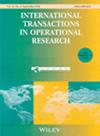Optimal emergency hospitals construction in an unexpected epidemic with considering the interactive effect
IF 3.1
4区 管理学
Q2 MANAGEMENT
引用次数: 0
Abstract
Constructing emergency hospitals is one of the most critical measures to defeat an unexpected epidemic. However, existing operations research (OR) studies rarely consider the interactive effect between the construction of emergency hospitals and the dynamics of epidemic transmission. Inspired by this gap, we propose a new modeling framework for decision‐making in emergency hospital construction. In our optimization model, we address the pandemic evolution functions as constraints. We also consider the heterogeneity among infected individuals, distinguishing between those with mild and severe symptoms, each requiring treatment in different types of emergency hospitals. We formulate the problem as a mixed integer nonlinear programming model. Our model can envision the current and future evolution of the epidemic and the impact of different decisions regarding emergency hospital construction on epidemic development. Simultaneously, it provides the optimal strategy to build hospitals and minimize the total number of untreated patients due to the disease. The proposed model is tested using the Covid‐19 outbreak case in Wuhan. The results can provide precise guidelines for emergency hospitals construction, including timing and capacity, and offer decision boundaries for policymakers considering the uncertainty of disease transmission. Furthermore, our decision‐making framework is general and can be adapted to study other epidemics.突发疫情中考虑互动效应的最佳急救医院建设
建设急救医院是战胜突发疫情的最关键措施之一。然而,现有的运筹学(OR)研究很少考虑应急医院建设与疫情传播动态之间的互动效应。受这一空白的启发,我们提出了一个新的急救医院建设决策模型框架。在我们的优化模型中,我们将流行病演变函数作为约束条件。我们还考虑了感染者之间的异质性,区分了症状轻微和严重的感染者,每种感染者都需要在不同类型的急诊医院接受治疗。我们将问题表述为一个混合整数非线性编程模型。我们的模型可以预测疫情当前和未来的发展情况,以及建设急诊医院的不同决策对疫情发展的影响。同时,它还提供了建设医院的最佳策略,并最大限度地减少因疾病而未得到治疗的病人总数。提出的模型通过武汉 Covid-19 疫情案例进行了检验。结果可为急救医院的建设(包括时间和容量)提供精确的指导,并为考虑到疾病传播的不确定性的决策者提供决策边界。此外,我们的决策框架具有通用性,可用于研究其他流行病。
本文章由计算机程序翻译,如有差异,请以英文原文为准。
求助全文
约1分钟内获得全文
求助全文
来源期刊

International Transactions in Operational Research
OPERATIONS RESEARCH & MANAGEMENT SCIENCE-
CiteScore
7.80
自引率
12.90%
发文量
146
审稿时长
>12 weeks
期刊介绍:
International Transactions in Operational Research (ITOR) aims to advance the understanding and practice of Operational Research (OR) and Management Science internationally. Its scope includes:
International problems, such as those of fisheries management, environmental issues, and global competitiveness
International work done by major OR figures
Studies of worldwide interest from nations with emerging OR communities
National or regional OR work which has the potential for application in other nations
Technical developments of international interest
Specific organizational examples that can be applied in other countries
National and international presentations of transnational interest
Broadly relevant professional issues, such as those of ethics and practice
Applications relevant to global industries, such as operations management, manufacturing, and logistics.
 求助内容:
求助内容: 应助结果提醒方式:
应助结果提醒方式:


